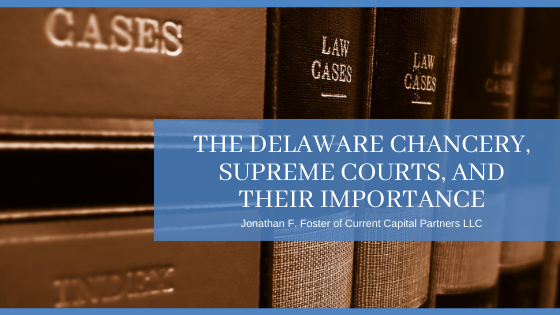Rulings from the Delaware Court of Chancery and the Delaware Supreme Court have become the foundation for corporate law and a critical guide for corporate governance. Over one million businesses today list Delaware as their legal home, including roughly two-thirds of the Fortune 500. It has been the principal state where businesses have registered since the early 1900s.
Delaware is not a tax haven, and business startup costs are not exceptionally low. How did the nation’s second-smallest state become the hub of commercial business formation? Equally important, why is the Delaware Court of Chancery so crucial for its decisions regarding business transactions?
The Court’s inception dates back to 1792 and is based on the Chancery Courts of English law, where Chancellors arbitrated when the King’s laws did not provide an obvious legal remedy. One thing that made these English Courts unique is that cases were heard not by a jury but by a single judge knowledgeable about and experienced in corporate law. This contributed to decisions that tended to be more predictable and less susceptible to bias and public opinion than those rendered by juries.
While there are numerous other courts around the country, some of whom hear a substantial number of business cases, none compare to the Court of Chancery’s 100 years of corporate law precedent. The Chancellor and vice-chancellors are business law experts who are not elected. They must be residents of Delaware and knowledgeable about the law; they are nominated by Delaware’s governor and confirmed for 12-year terms by the senate. The Court consistently attracts outstanding judges because the Court of Chancery is so highly respected.
Another unique aspect of the Delaware Chancery Court is that any decision can be appealed to Delaware’s Supreme Court. The governor makes 12-year appointments, and this Court must have an equal number of Republican and Democratic appointees. Notably, no other state requires judges to have a declared political party.
Former Chief Justice William Chandler noted in 2011, “The biggest difference that I have noticed in the cases filed with the Court from 1989 until today is the relentless increase in the number and complexity of cases seeking expedited or summary proceedings. I am not certain of all the reasons for it, but in part, I think we may be a victim of our success—that is, we can provide prompt hearings and trials and rulings, and that yields even higher expectations and demands from practitioners for even more of the same. It no doubt is also a function of the needs of businessmen and businesswomen, who operate with a “real-time” mentality and understandably expect the Court of Chancery to do likewise regarding their disputes. However, the result is an environment of intense pressure on members of my Court to handle a regular caseload and simultaneously address daily emergency applications and motions for the summary or expedited proceedings. That is the change or difference in this Court’s cases or work that stands out for me.”
The decisions made by the Chancery Court tend to be predictable, as they are generally based on established law. The expertise of the Chancery Court is widely accepted as often being superior and more desirable when it comes to rulings than educating a jury on corporate law. The Court is a significant reason why Delaware has become a popular state to conduct business, despite being the second smallest in the United States. More than half of publicly traded companies are officially listed in Delaware.
The Chancery Court frequently rules on mergers and acquisitions cases. For example, plaintiffs often claim that shareholders were under-informed or misinformed. The Court determines whether the company supplied adequate information to shareholders, allowing them to cast their votes with confidence. If not, additional information, and potentially sanctions, may be required.
Another matter that has received Chancery Court attention in recent years is the trend of corporate social responsibility and community involvement. This refers to considering stakeholders other than shareholders. The Court’s Business Judgment rule generally endorses these efforts as long as they are expected to have positive effects on long-term shareholder value.
The cumulative knowledge of the Delaware Court of Chancery has made the state attractive to businesses looking to take advantage of an experienced, sophisticated forum to resolve corporate disputes. The Court continues to encourage business formation in one of our country’s smallest states.
Jonathan F. Foster
Founder & Managing Director – Current Capital Partners LLC

